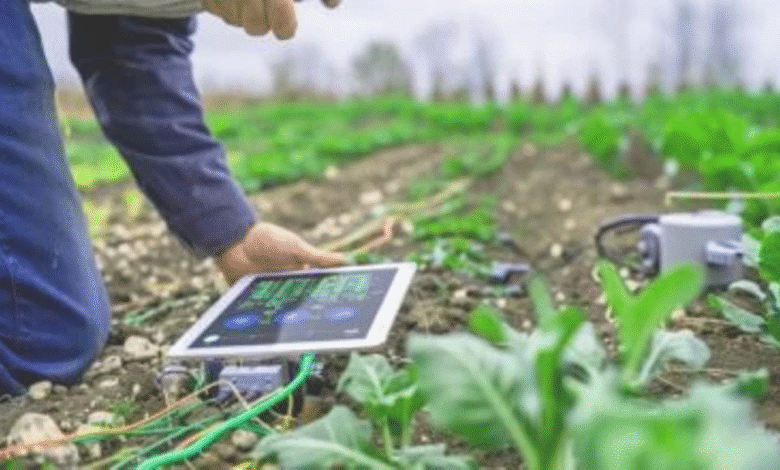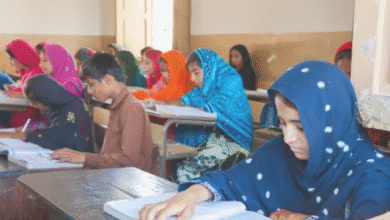
IoT (Internet of Things) is revolutionizing Pakistan’s agriculture sector, offering innovative solutions to age-old challenges. As the backbone of the country’s economy, agriculture employs millions but struggles with water scarcity, climate change, and outdated practices. IoT bridges this gap by introducing smart farming technologies such as soil sensors, automated irrigation, and drone monitoring that optimize resource use, boost crop yields, and empower farmers with real-time data. This technological shift is not just improving productivity but also transforming rural livelihoods, making agriculture more sustainable and profitable in Pakistan.
The adoption of IoT in agriculture is particularly crucial for Pakistan, where traditional farming methods often lead to inefficiencies and financial losses. With the help of connected devices, farmers can now monitor weather patterns, soil conditions, and crop health remotely, reducing guesswork and manual labor. From small-scale farmers in Punjab to large agribusinesses in Sindh, IoT is enabling precision agriculture, minimizing water wastage, and preventing crop diseases before they spread. As Pakistan faces growing food security challenges, IoT emerges as a key driver in modernizing the sector, ensuring resilience against climate threats and fostering economic growth.
How IoT Is Changing Lives in Pakistan’s Agriculture Sector
Precision Farming and Smart Irrigation
One of the most significant contributions of IoT in Pakistan’s Agriculture Sector is precision farming. Farmers can now use soil moisture sensors, weather stations, and drones to monitor field conditions in real time. These devices collect data on temperature, humidity, and soil health, allowing farmers to make informed decisions. For instance, smart irrigation systems use IoT sensors to deliver water only when needed, reducing wastage by up to 50%. In a country where water scarcity is a major concern, this technology is a game-changer, ensuring optimal water usage while maintaining crop health.
Livestock Monitoring and Management
IoT is not limited to crop farming it also plays a crucial role in livestock management. Wearable sensors for cattle track health metrics such as heart rate, activity levels, and feeding patterns. This helps farmers detect diseases early, improve breeding efficiency, and enhance milk production. In Punjab and Sindh, where dairy farming is a major livelihood, IoT-enabled solutions are helping small-scale farmers increase profitability by reducing losses due to illness or poor nutrition.
Crop Monitoring and Disease Prediction
Traditional farming relies heavily on guesswork, but IoT introduces data-driven approaches. Drones equipped with multispectral cameras can scan large fields, identifying pest infestations or nutrient deficiencies before they spread. Machine learning algorithms analyze this data to predict disease outbreaks, allowing farmers to take preventive measures. For example, In Agriculture Sector of cotton farmers in southern Punjab have used IoT-based pest detection systems to minimize pesticide use, lowering costs and environmental impact.
Supply Chain Optimization
Post-harvest losses are a major issue in Pakistan due to poor storage and transportation. IoT-enabled cold storage units and GPS-tracked logistics ensure that perishable goods like fruits and vegetables reach markets in optimal condition. Sensors monitor temperature and humidity during transit, reducing spoilage. This not only increases farmers’ profits but also ensures food security by minimizing waste.
Empowering Small Farmers with Affordable IoT Solutions
While large-scale farms quickly adopt IoT, small farmers often lack access due to cost barriers. However, startups and government initiatives are introducing low-cost IoT devices tailored for rural Pakistan. Mobile apps connected to sensors allow farmers to receive alerts and recommendations via SMS, even without smartphones. Such innovations are democratizing technology, ensuring that even subsistence farmers benefit from IoT advancements.
Challenges of IoT adoption in Pakistan’s agriculture
Despite its potential, IoT adoption in Pakistan’s agriculture sector faces hurdles such as high initial costs, limited internet connectivity in Rural area, and a lack of technical expertise. However, partnerships between the government, private sector, and NGOs are addressing these challenges. Subsidies on IoT devices, training programs for farmers, and improved rural internet infrastructure are paving the way for wider adoption.
Future Prospects Agriculture Sector
Expansion of AI and IoT Integration
Artificial Intelligence (AI) combined with IoT will enable smarter decision-making in Agriculture Sector. AI-powered analytics can process vast amounts of data from soil sensors, weather forecasts, and crop health monitors to provide predictive insights. For example, AI can suggest optimal planting times, detect disease outbreaks before they spread, and even automate pesticide application. This synergy will make farming more precise, reducing costs and increasing yields.
Blockchain for Transparent Supply Chains
Blockchain technology, when integrated with IoT, can revolutionize Agriculture Sector supply chains in Pakistan. Smart contracts can ensure fair pricing for farmers by eliminating middlemen, while IoT-enabled tracking can verify the authenticity and quality of produce from farm to market. This transparency will reduce food fraud, improve export potential, and ensure farmers receive fair compensation for their crops.
Government and Private Sector Initiatives
Future growth of IoT in Agriculture Sector depends on supportive policies and investments. The government, in collaboration with agri-tech startups and telecom companies, can subsidize IoT devices, improve rural internet connectivity, and launch training programs for farmers. Public-private partnerships will be crucial in scaling IoT solutions across small and large farms alike.
Climate-Resilient Farming
With climate change posing severe risks to Agriculture Sector, IoT will play a vital role in climate adaptation. Smart irrigation systems, drought-resistant crop monitoring, and real-time weather alerts will help farmers mitigate risks. IoT-enabled greenhouses and vertical farming could also gain traction, allowing year-round cultivation despite extreme weather conditions.
Affordable IoT Solutions for Small Farmers
The future will see more cost-effective IoT devices tailored for small-scale farmers. Solar-powered sensors, low-bandwidth IoT networks, and mobile app-based analytics will make technology accessible even in remote areas. As affordability improves, widespread adoption will lead to a more inclusive agricultural revolution.
Drone Technology and Automation
Drones equipped with multispectral cameras and IoT connectivity will become mainstream for crop monitoring, spraying fertilizers, and mapping fields. Autonomous tractors and robotic harvesters may also enter the market, reducing labor costs and increasing efficiency.
Enhanced Livestock Management
IoT will further improve livestock farming through advanced wearables that monitor health, fertility, and milk production in real time. Predictive analytics can alert farmers about potential diseases, improving herd management and productivity.
Read More: Digital Pakistan & Freelancing: Opportunities for the Youth
Conclusion
The integration of IoT in Pakistan’s agriculture sector is bringing unprecedented efficiency, sustainability, and profitability. By enabling precision farming, smart irrigation, livestock monitoring, and supply chain optimization, IoT is helping farmers overcome traditional challenges and adapt to modern demands. While barriers like cost and connectivity remain, ongoing initiatives are making these technologies more accessible to small-scale farmers.
As IoT continues to evolve, its impact on Pakistan’s agriculture will only grow stronger. With the right policies and investments, IoT can drive a green revolution, ensuring food security, economic growth, and improved livelihoods for millions of farmers. The future of farming in Pakistan is smart, data-driven, and sustainable thanks to the power of IoT.
FAQs
What is IoT in Agriculture Sector?
IoT in Agriculture Sector refers to using connected devices like sensors, drones, and automated systems to monitor and optimize farming processes for better efficiency and productivity.
How does IoT help Pakistani farmers?
IoT helps Pakistani farmers by providing real-time data on soil, weather, and crop health, enabling precision farming, reducing water waste, and improving yields.
Are IoT solutions affordable for small farmers?
While some IoT devices are expensive, affordable solutions like SMS-based alerts and low-cost sensors are being introduced to help small farmers benefit from the technology.
What are the challenges of IoT adoption in Pakistan?
Challenges include high costs, limited rural internet access, and a lack of technical knowledge among farmers.
Can IoT improve Pakistan’s food security?
Yes, IoT can enhance food security by reducing crop losses, optimizing resource use, and improving supply chain efficiency, ensuring more stable food production.











